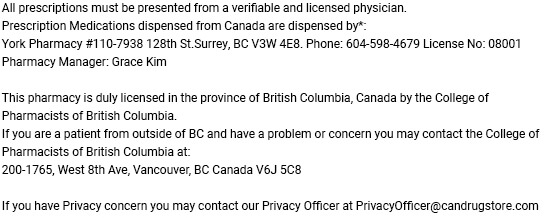Description
Indications
Nicoumalone is employed to prevent and treat harmful blood clots, thereby reducing the risk of a stroke or heart attack.
This medication contributes to maintaining smooth blood flow in the body by reducing the levels of clotting proteins in the blood. It is specifically used to lower the risk of developing blood clots associated with conditions like a certain type of irregular heart rhythm, heart valve replacement, or a recent heart attack. Nicoumalone is classified as an anticoagulant, commonly referred to as a “blood thinner.”
Uses and Dosage
Take this medication orally, typically once a day or as instructed by your doctor. Adhere strictly to the prescribed dosage.
Consistently use this medication to derive maximum benefit from it. To help you remember, take it at the same time each day. Do not exceed the prescribed dose or take it more frequently than directed.
Do not abruptly discontinue this medication unless advised by your doctor. If discontinuation is necessary, your doctor may recommend gradually reducing your dose over a period of 3 to 4 weeks.
The dosage of this medication is determined by your medical condition, results of laboratory clotting tests, and response to treatment. Follow your doctor’s instructions carefully regarding dosage adjustments.
Side Effects
Some side effects may occur that usually do not need medical attention:
- diarrhea
- fever
- hives
- itchy skin
- loss of appetite
- loss of hair
- nausea
- vomiting
Inform your healthcare provider immediately if you experience any serious side effects:
- bleeding from cuts that take a long time to stop
- bleeding gums
- headaches, dizziness, or weakness
- heavier than normal menstrual bleeding
- nosebleeds
- numbness or tingling of the face, hands, or feet
- pain, swelling, or discomfort
- paralysis
- pink or brown urine
- sudden shortness of breath
- unexplained bruising
- unusual pain or swelling
- fainting
Caution
- Before taking acenocoumarol, inform your doctor or pharmacist if you are allergic to it, other anticoagulants (such as warfarin), or if you have any other allergies. Inactive ingredients in the product may cause allergic reactions or other issues.
- Share your medical history with your doctor or pharmacist, especially if you have blood disorders, bleeding problems, recent or planned surgery/procedures, liver disease, kidney disease, alcohol abuse, tissue damage, severe injury, high blood pressure, severe diabetes, congestive heart failure, cancer, collagen vascular disease (such as lupus, polyarteritis), inflammatory disease (such as arthritis, vasculitis), radiation therapy, underactive or overactive thyroid (hypothyroidism or hyperthyroidism), poor nutrition, intestinal absorption problems, low blood levels of vitamin K, swelling of the arms/legs (edema), or high levels of cholesterol/blood fats.
- Avoid getting injections into the muscles; if necessary, limit injections to the arms.
- If you experience an illness or infection causing vomiting, diarrhea, or fever for more than a few days, contact your doctor promptly, as these conditions can impact how well this drug works.
- To reduce the risk of bleeding due to cuts, bruises, or injuries, exercise caution with sharp objects like safety razors and nail cutters. Use an electric razor when shaving and a soft toothbrush when brushing your teeth. Steer clear of activities such as contact sports.
- Ensure that all your doctors and dentists are aware that you are taking acenocoumarol.
- Use caution when administering this drug in the elderly, as they may be more sensitive to its effects.
- This medication must not be used during pregnancy as it may harm an unborn baby. Discuss reliable forms of birth control with your doctor. If you become pregnant or suspect pregnancy, notify your doctor immediately. If pregnancy is planned, consult with your doctor beforehand. Another type of anticoagulant (such as heparin) is preferred during pregnancy. Seek advice from your doctor for more information.
- This medication passes into breast milk in small amounts. While no harm to nursing infants has been reported, you should consult your doctor before breastfeeding.
Form and Strength
Sintrom is available in the following forms and strengths:
- Sintrom tablet:
- 1 mg
- 4 mg
- nicoumalone tablet:
- 1 mg
- 2 mg
FAQ
Is Sintrom the same as Warfarin?
Both medications are similar and effective blood thinners. However, Warfarin is employed more frequently than Sintrom because of its longer half-life (36 h), theoretically providing more stable anticoagulation.
Can you drink alcohol while taking Sintrom?
Sintrom’s interaction with alcohol is unknown. You should consult your doctor before consumption while taking this medication.
Resources
- https://pubmed.ncbi.nlm.nih.gov/9869157/#:~:text=Warfarin%20is%20employed%20more%20frequently,half%2Dlife%2010%20h)
- https://patient.info/medicine/acenocoumarol-an-anticoagulant-sinthrome
- https://www.medbroadcast.com/drug/getdrug/sintrom#adverseeffects
- https://www.practo.com/medicine-info/acenocoumarol-785-api
- https://www.healthlinkbc.ca/medications/acenocoumarol-nicoumalone-oral


 Prescription Required
Prescription Required  Formulation :
Formulation : 




